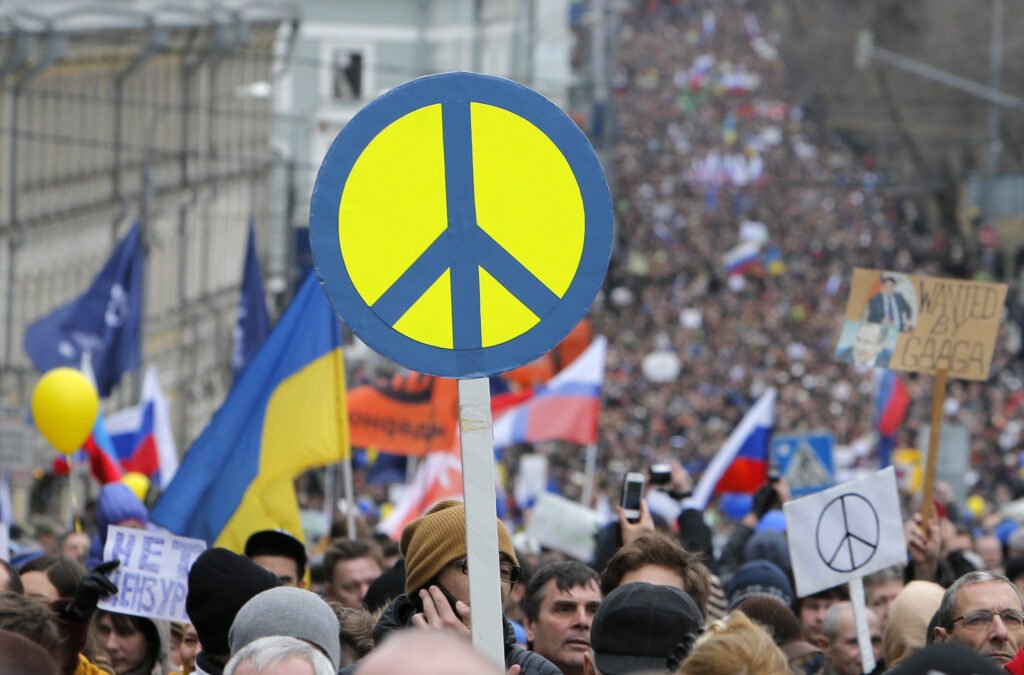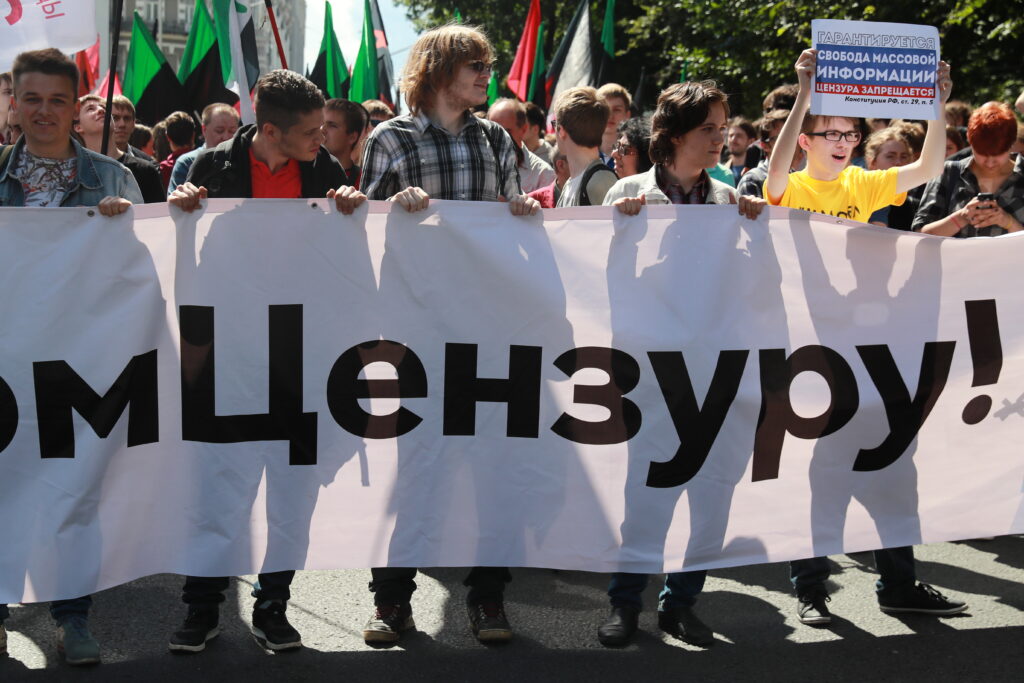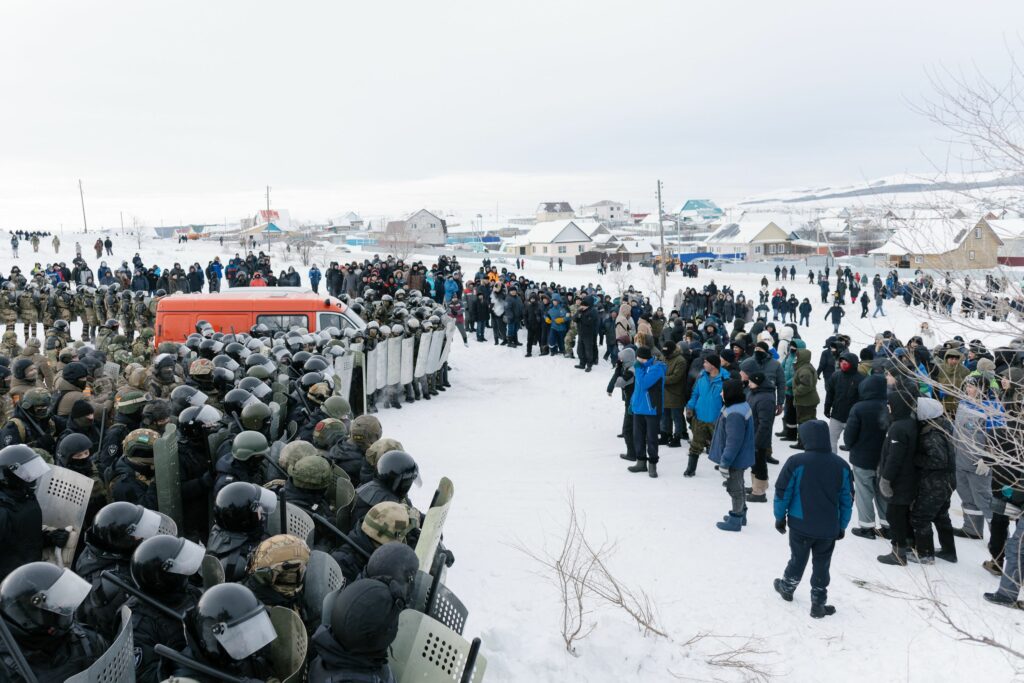One of the major stories of recent years in Russia — though still not widely discussed — has been how various ecological and conservationist movements have coalesced. This year, they tried to stage a series of regional ecology-related referenda. They did not succeed, but this does not mean these initiatives will have no impact.
In August, “We Are To Live Here”, an umbrella organization of environmental and conservationist movements from various regions, announced that it had initiated eleven referenda in eight regions about ecological issues of regional importance. In Moscow, activists wanted a vote on the preservation of the Bitsa Park in the outskirts of Moscow; in the Volgograd Region they wanted to prevent the construction of a road through a protected area; in the Astrakhan Region, they initiated a vote against a new petrochemical plant; in the Kaluga Region, the issue was a planned landfill near the town of Ilyinskoye, dangerously close to a river; in Tatarstan and the Moscow Region, residents suggested a vote on several waste incineration plants, as well as (in the Moscow Region) about air traffic causing noise pollution in a residential area. In the Kemerovo Region, a highly polluted industrial heartland, local activists suggested the adoption of a regional law on environmental protection. In St. Petersburg, a proposal aimed to restrict pollution in the Gulf of Finland.
Perhaps predictably, all initiatives that have been reviewed by regional authorities were immediately rejected on various – mostly technical – grounds. The proposal on limiting air traffic was accepted by the Moscow Region’s electoral committee, only to be rejected by the regional legislature on the pretext that organizing air traffic control was a federal competence, thus a referendum would create legal uncertainty.
The realities of calling a referendum
No one would call Russia a haven of direct democracy, even though the right to organize and participate in referenda is guaranteed by a federal law from 2004 as well as in the constitution and the electoral law. But this does not mean referendums are actually called: the country held its last national referendum in 1993 (the 2020 vote on Vladimir Putin’s constitutional amendments was officially a “plebiscite”), and the last attempt to collect two million signatures in support of a common cause across the country – against the 2018 pension reform – failed.
Regional and local referenda are also rarely used. In the past two decades, most regional referenda covered administrative changes such as the merger of regions in 2005-08, changes in the constitutions of autonomous republics (in Chechnya or Tuva), or other issues that the government of the regions in question supported. Most recently, in March, voters in the Khabarovsk Territory voted down the establishment of a Chinese methanol factory. In almost every case, the local authorities supported and initiated the vote. Local referenda are more frequently held – sometimes several hundreds of them are held on the same day – but these usually concern apolitical issues: overwhelmingly “self-taxation” (samooblozhenie), the introduction of small, flat fees to support some kind of local social purpose (and occasionally the reorganization of municipalities, e.g. changing their borders). In any case, using referenda for participatory budgeting is not widespread. Over the past two decades, this kind of local referenda have been concentrated in a handful of regions, with three – Tatarstan, the Kirov Region and the Perm Territory – conducting the overwhelming majority of them. Contentious issues and grassroots proposals usually do not reach even this stage.
Officially, it should not be difficult to initiate regional and local referenda. Organizers need to collect signatures representing up to two percent of regional or up to five percent of local voters (the rules are specified by regional laws). This is in line with European standards. It is, of course, true that when collecting signatures in support of any independent cause, Russian activists have faced difficulties that German or Dutch activists do not, ranging from physical intimidation or growing fears that supporters’ personal data will be exposed, to the rejection of a large number of signatures on dubious grounds.
But in most cases referendum proposals do not even reach this stage. Regional and local authorities – first and foremost, electoral committees controlled by United Russia nominees – have a large toolbox to nip proposals in the bud. The rejection of this year’s ecological proposals offers a sample of these. The regional parliament can raise the minimum number of initiative group members high enough to make even introducing a proposal cumbersome (this is what happened in Volgograd). They can (as in the case of the proposal on limiting air traffic) claim that an issue does not fall under the jurisdiction of the local or the regional government. They can declare the initiative invalid on a range of technicalities (e.g. invalid passport numbers or erroneous supporting documents, as in Tatarstan or the Astrakhan Region; or using inconsistent wording or wrong spelling, as in Moscow). They can use direct intimidation: in the Kaluga Region, a member of the initiative group was allegedly threatened by an agent of the local FSB division, and then withdrew her support, which was enough for the local election authorities to reject the proposal. Often they would use a combination of these. Especially when activists file a petition more than once: the waste incinerator referendum in Tatarstan was first thwarted by the region’s parliament, and, a year later, rejected already by the regional electoral committee.
Contagions
The authorities seem to be especially wary of referenda on local issues that are actually local manifestations of cross-national issues. Over the past decade regional and local authorities in several regions have systematically stifled referendum initiatives on bringing back the direct election of mayors (presently possible only in seven Russian cities), going so far as forbidding initiating such referenda, by a federal law in 2014.
The situation is similar with ecological proposals, both this year and earlier. On the surface, the issues seem little to do with each other. Yet the way these organizations coordinated the proposals and presented them as parts of a cross-country environmental vote, suggested a conscious attempt to present these as simply the different manifestations of one big underlying issue: the neglect of nature (and green urban spaces) in the regions in favor of powerful vested interests, against which local movements have taken up the fight in the past years increasingly vigorously and an increasingly connected manner.
Indeed, one of the biggest risks of this kind of proposals for the authorities is that initiatives, even if only partly successful, can inspire similar movements elsewhere. On top of that, they strengthen the connections between local grassroots networks and the population. The long (and ultimately unsuccessful) movement for the preservation of the Khimki Forest near Moscow preceded (and some say, helped) anti-government protests in the capital in 2011-12. A similarly long-haul – and successful – movement against the Shiyes landfill in the Arkhangelsk Region gave birth to “We Are To Live Here”, and directly inspired and informed similar protests elsewhere, including in Bashkortostan, where a movement for the preservation of the Kushtau sacred mountain borrowed tactics from Shiyes protesters. “Shiyes” became shorthand for similar protest movements. One of the movement’s leaders, Oleg Mandrykin, came second behind United Russia’s candidate in this year’s Duma election.
Shiyes protesters achieved all this in spite of how their proposals to hold a referendum were repeatedly rejected. The struggle to hold a vote on a clearly important issue shone a light on the unwillingness of the authorities to listen to the region’s residents. First the regional electoral commission then the regional parliament and finally the Supreme Court rejected the proposal. As Dmitry Kochanov, one of the organizers behind the eco-referenda told Kommersant: even if the proposals are rejected, the organizations are at least able to signal the problem. This is like how several local activists who tried to run for office in this year’s Duma election described the purpose of running in spite of hostile conditions and close to zero chances of coming out ahead in the official count.
Agenda-setting
There is some evidence suggesting that activists have managed to move some issues to the government’s agenda. The Shiyes movement managed to fell a governor and get the project cancelled. And it seems that in spite of the vested interests, the government is increasingly critical of plans to build waste incinerators, a key element of a 2019 waste management reform: in June deputy prime minister Viktoria Abramchenko criticized the project of building 25 of these plants by the state-owned Rostec, highlighting that not only was the financing unclear, the projects were also not sufficiently discussed with local citizens.
This, of course, is far from ideal, especially considering recently announced changes to the status of regional governors. These will make it possible for them to stay in power for more than two consecutive terms, while preventing their appointment to head another region for five years should they be dismissed by the president for an unspecific “lack of trust.” The reforms will also give federal authorities a larger say in appointing regional officials. These make it significantly less likely that regional officials and institutions could in future support or tolerate local protest movements or referendum proposals without the consent of the federal government.
But the key is the movements’ agenda-setting power, which works in two directions and thus can make an impact even when the regional authorities close doors. Not all referendum initiatives are going to lead to protests; in fact, in most recent examples, the mechanism worked the other way around: in Shiyes or in the Moscow Region referendum initiatives built on earlier protests. However, with a widening crackdown on dissent whose aim is to dissuade people from taking to the streets, such initiatives can help regional movements stay together.
High legal hurdles incentivize movements of various sorts to help one another, either across regions by coordinating filing and legal aid, as in the case of “We Are To Live Here”, or within regions, as political movements with an existing infrastructure lend their infrastructure to collect signatures, in exchange for “borrowing” a popular cause. In the Kurgan Region, for instance, Alexey Navalny’s local organization supported a referendum initiated by local activists on uranium mining in 2020. The liberal Yabloko party lent its support to several such causes, e.g. this year’s proposal to vote against a waste incinerator in Tatarstan. Several local and regional activists – including two leaders of the Shiyes movement — ran as Yabloko candidates in the September Duma election.
There is statistical proof suggesting that so-called “protest regions” – a vague term used in Russian political parlance to describe regions either with a recent history of protests or a high proportion of dissatisfied and active voters – are less likely to experience large-scale fraud in elections, likely due to the inherent political risks for the authorities. More honest elections, in turn, provide opportunities for independent and opposition candidates to win seats, access and publicize key data, and resist repressive initiatives, as some did in Moscow, Novosibirsk or Tomsk.
Civil and sometimes political movements pressing for referenda on ecological issues is not a novelty in Russian politics – neither are the authorities’ determination to thwart these initiatives. But as the effects of climate change and industrial pollution are increasingly laid bare in Russia (despite the authorities’ best efforts to hide information), activists are increasingly well-organized and are able to build on local grievances to broaden their appeal. So regardless of September’s setbacks, ecological activists may still be able to catalyze major changes.










